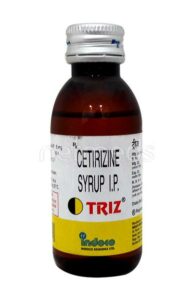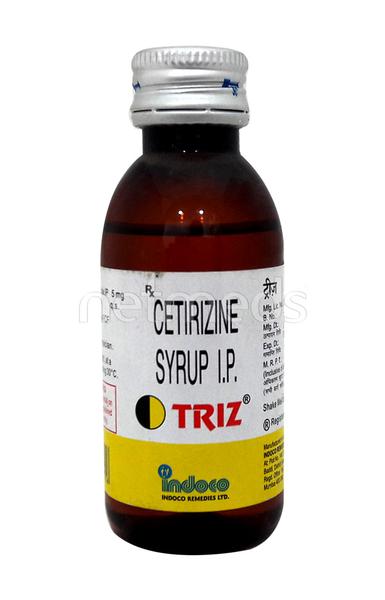Triz Syrup 60ml
$12.00 $9.00
Triz Syrup 60ml

Description
Give this medicine to your child orally with or without food in the dose, time, and way prescribed by your child’s doctor. It could either be prescribed alone or in combination with other medicines. The allergic symptoms may subside after your child has taken the initial few doses of triz syrup. In case of serious allergic conditions, your child may have to continue taking the medicine for a week or two. If your child vomits within 30 minutes of taking this medicine, repeat the same dose after your child feels better. But, refrain from doing so if it is already time for the next dose.
Your child may experience mild side effects like nausea, vomiting, dry mouth, dizziness, sleepiness, and headache after taking this medicine. These symptoms are usually non-serious and disappear on their own. However, in case of prolonged or bothersome events, it would be best to consult your child’s doctor without any delay.
Inform your child’s doctor if your child is on any medicines or is allergic to any medicine, product, or food. Do inform the doctor if your child has or had any heart, liver, kidney problems or was born prematurely. Share any history regarding bowel obstruction, malnutrition, weight-related issues, and thyroid problems with the doctor. Knowledge of your child’s medical history will help avoid any complications in the treatment and guide your child’s doctor to plan your child’s overall treatment better.

USES OF TRIZ SYRUP IN CHILDREN
- Treatment of Allergic conditions
BENEFITS OF TRIZ SYRUP FOR YOUR CHILD
In Treatment of Allergic conditions
SIDE EFFECTS OF TRIZ SYRUP IN CHILDREN
Common side effects
- Nausea
- Headache
- Muscle pain
- Edema (swelling)
- Sleepiness
- Dizziness
HOW CAN I GIVE TRIZ SYRUP TO MY CHILD?
HOW TRIZ SYRUP WORKS
SAFETY ADVICE

Kidney

Liver
However, dose adjustments are required in severe liver disease. Consult your doctor before giving Cetirizine to your child in case of severe liver disease.
WHAT IF I FORGET TO GIVE TRIZ SYRUP TO MY CHILD?
Habit Forming
Diet & Lifestyle Advice
- Staying hydrated is vital for those with a cough or cold. Drinking liquids at room temperature can alleviate cough, runny nose, and sneezing.
- The immune system is affected by stress and raises the risk of being sick. An individual can exercise regularly, meditate, do deep breathing, and try progressive muscle relaxation techniques to relieve stress.
- To stay fit and safe, try to sleep 7-9 hours each night.
- It is advised to avoid contact with known allergens (allergy-causing agents) such as pollen, dust, etc. Certain food items are known to cause allergies to you.
- Maintain personal hygiene and keep your surroundings clean.
Special Advise
Drive with caution.
preferred to take tablet before sleep.
Be the first to review “Triz Syrup 60ml” Cancel reply
Related products
Allergies
Allergies
Allergies
Allergies
Allergies
Allergies
Allergies
Allergies












Reviews
There are no reviews yet.